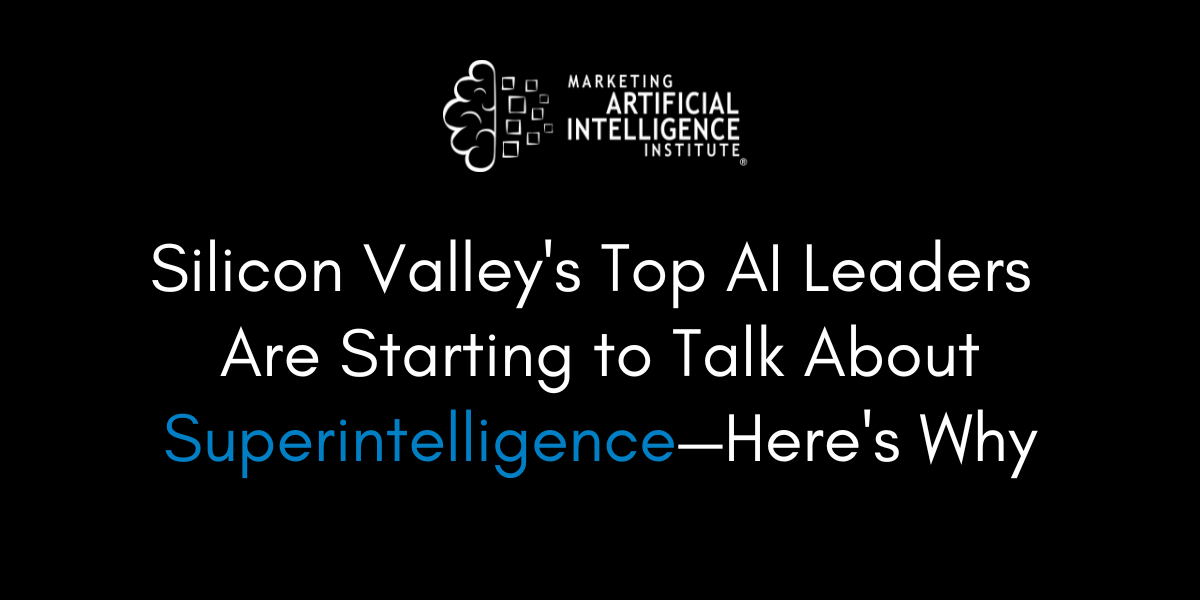The conversation around AI just took a dramatic turn.
On the heels of OpenAI's o3 breakthrough, prominent figures in AI have started openly discussing something that sounds like science fiction: artificial superintelligence (ASI), or AI systems that would surpass human capabilities in every imaginable field.
But here's what's turning heads:
These aren't fringe voices. They're some of the most influential leaders in AI, including Sam Altman.
What's going on here? Are we really on the cusp of superhuman AI?
I talked with Marketing AI Institute founder and CEO Paul Roetzer about why this sudden focus on superintelligence deserves our attention on Episode 129 of The Artificial Intelligence Show.
A Flood of ASI Signals
It all started when Logan Kilpatrick, Product Lead at Google AI Studio, made waves on X (formerly Twitter) by saying “straight shot to ASI is looking more and more probable by the month,” even name-checking Ilya Sutskever.
Straight shot to ASI is looking more and more probable by the month… this is what Ilya saw
— Logan Kilpatrick (@OfficialLoganK) December 30, 2024
Sutskever was formerly Chief Scientist at OpenAI before launching Safe Superintelligence (SSI), a new startup dedicated to going “straight” to building superintelligence, instead of pausing at more incremental AI products along the way.
Then, Sam Altman himself stirred the pot with a six-word post:
i always wanted to write a six-word story. here it is:
— Sam Altman (@sama) January 4, 2025
___
near the singularity; unclear which side.
Other OpenAI employees also posted about ASI, including researcher Stephen McAleer, who said:
I kinda miss doing AI research back when we didn't know how to create superintelligence.
— Stephen McAleer (@McaleerStephen) January 4, 2025
"This isn't a new concept," says Roetzer, "but the conversation has accelerated dramatically."
The Path to Superintelligence
ASI has been a topic of discussion in very small circles for decades, says Roetzer. Philosopher Nick Bostrom wrote the seminal book Superintelligence in 2014. Ray Kurzweil popularized the idea of the “singularity” years earlier.
But, until recently, this topic wasn't much discussed by technology and business leaders. However, as soon as ChatGPT exploded onto the scene, talk of AGI became more mainstream. Now, just 12 to 18 months later, experts are jumping from AGI to superintelligence.
In May 2024, DeepMind (credited with coining the term "AGI" back in 2002) released a framework outlining five levels of AI progress. Level 5—superintelligence—describes systems that can outperform 100% of humans at any task.
Just a month later, in June 2024, ex-OpenAI researcher Leopold Aschenbrenner predicted superintelligence by the end of the decade, with AGI possible as early as 2027, in his essay Situational Awareness. But even those aggressive timelines are starting to look conservative.
Sam Altman, CEO of OpenAI, has also been vocal in September 2024 about the near-future possibility of superintelligence. He published a post titled The Intelligence Age in which he said:
"This may turn out to be the most consequential fact about all of history so far. It is possible that we will have superintelligence in a few thousand days (!); it may take longer, but I’m confident we’ll get there."
Now, at the start of 2025, Altman has released a new post titled Reflections, where he suggests OpenAI is “now confident we know how to build AGI” and that we should “turn our aim beyond that, to superintelligence in the true sense of the word.”
Says Roetzer:
"At superintelligence, we are now beyond any human—any scientist, any developer, any marketer, any entrepreneur, any CEO. They can't match what the AI can do."
Looking Ahead
You’d be forgiven for thinking superintelligence sounds outlandish. But the big players driving today’s most advanced AI systems seem to be saying it’s coming—and soon. When respected AI minds at Google, OpenAI, and new labs like SSI all converge on the idea that superintelligence is near, it’s wise to at least pay attention.
Whether ASI emerges in the next few years, remains further off, or ends up being a pipe dream, the conversation itself is reshaping how billions of dollars pour into AI research, products, and policy. We’re in uncharted territory. And if there’s one thing we learned from the explosive rise of ChatGPT, it’s that dramatic leaps in AI can happen faster than anyone anticipates.
Buckle up. Superintelligence may still sound sci-fi, but the world’s most powerful AI voices are telling us the future is closer than we think.
Mike Kaput
As Chief Content Officer, Mike Kaput uses content marketing, marketing strategy, and marketing technology to grow and scale traffic, leads, and revenue for Marketing AI Institute. Mike is the co-author of Marketing Artificial Intelligence: AI, Marketing and the Future of Business (Matt Holt Books, 2022). See Mike's full bio.



